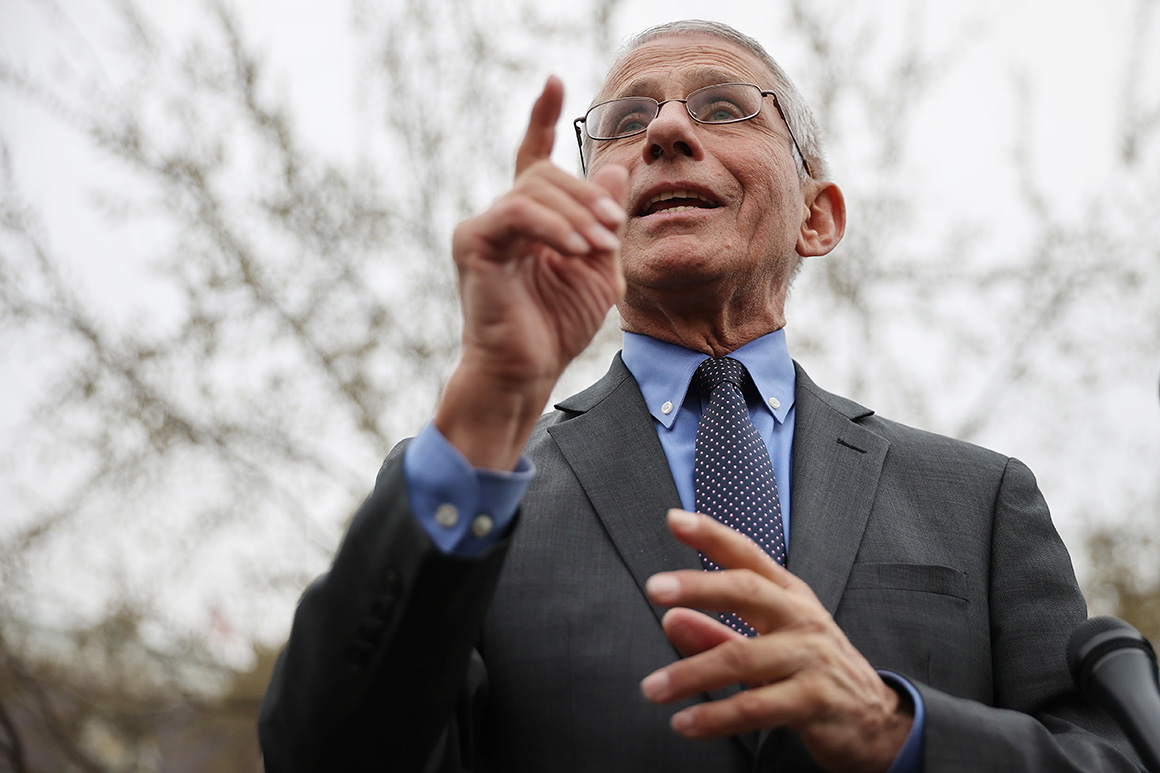
“Any pandemic like this runs the risk of exceeding our health care capacity, and we must acknowledge that,” Azar said at the White House briefing.
The administration’s coronavirus response effort has been hampered over the last month by the slow ramp-up of testing capabilities, forcing state health officials to ration tests and making it difficult for public health experts to understand how widely the disease has spread.
The new testing capacity will probably result in a spike of cases as state and local authorities have the ability to confirm cases more rapidly, administration officials cautioned.
Still, they urged Americans not to seek tests en masse — an effort to preserve the still-limited numbers of tests for those most at risk. Vice President Mike Pence, however, also noted that the federal government would “respect and defer to the decisions that are made by governors” in response to the coronavirus.
Trump also claimed that “young people, people with good health and groups of people just are not strongly affected,” contradicting Fauci, who insisted earlier on Sunday that everyone should take the virus seriously, including young people. Elderly and sick people are disproportionately at risk, though.
Younger people “are not immune or safe from getting seriously ill,” Fauci said. “There are going to be people who were young who are going to wind up getting seriously ill. So, protect yourself. But, remember, you could also be a vector or a carrier. And even though you don’t get seriously ill, you could bring it to your grandfather, your grandmother or your elderly relative.”
In a “Dear Colleague” letter to members of the House, Speaker Nancy Pelosi (D-Calif.) on Sunday thanked lawmakers for passing a bipartisan coronavirus response package over the weekend to provide economic relief to families and free testing for the virus. She said the chamber had already started working on another package, and encouraged members “to take steps to promote social distancing within your Washington, D.C. office” during the current recess after consulting the chamber’s attending physician and sergeant at arms.
“This may entail more than half of your Washington staff teleworking from home,” she wrote.
One former aide to Rep. Adam Schiff (D-Calif.), chairman of the House Intelligence Committee, tested positive for coronavirus on Sunday. Daniel Goldman, 44, who led the panel’s questioning during the impeachment inquiry in November, had been seeking a test in recent days after exhibiting symptoms and testing negative for the flu.
In a statement on Sunday, Schiff revealed that a former staffer had contracted coronavirus but didn’t identify Goldman by name. Goldman left Schiff’s office earlier this month, and Schiff indicated that doctors believed that the former staffer contracted the illness after his departure.
The National Institutes of Health told staff in a memo Sunday morning that an individual who works for the National Institute of Arthritis and Musculoskeletal and Skin Diseases but is not involved in patient care was being quarantined at home after testing positive for the virus.
“While this is an unfortunate development, it is not surprising, and NIH expects that there will be more cases of infection among NIH staff,” NIH Director Francis Collins said in a statement.
Ahead of Sunday’s announcement, NIH had already announced steps to shift its staff toward remote work beginning on Monday. In the email, Collins also acknowledged that many staff would need to remain on site to continue to support the NIH’s facilities, conduct research and other in-person activities.
Back at the White House, Trump held a call with more than two dozen grocery store and supply chain executives early Sunday afternoon.
Shoppers across the country have encountered long lines and empty shelves in recent weeks as the outbreak has spread. And food retailers have begun overhauling their operations, reducing store hours to give employees more time to restock overnight, limiting the purchase of specific food items, urging customers to bring their own shopping bags, and adding grocery delivery and curbside pickup options.
“You don’t have to buy so much,” Trump urged consumers. “Take it easy. Just relax. People are going in, and they’re buying more. … Relax. We’re doing great. It all will pass.”
A readout from a White House spokesman, Judd Deere, similarly discouraged Americans from hoarding.
“All of the executives are working hand-in-hand with the federal government, as well as state and local leaders, to ensure food and essentials are constantly available,” Deere said in a statement. “The president reminded the participants that this is an all-of-America approach and each of their stores and the stores they support can help Americans feel calm and safe when shelves are stocked with the items they need. Supply chains in the United States are strong, and it is unnecessary for the American public to hoard daily essentials.”
In an interview on ABC’s “This Week,” the White House economic adviser, Larry Kudlow, guaranteed that there was enough stock in the supply chain for people to be able to provide food for their families at home without running out of supplies, though he noted that “there may be some exceptions.”
“I’ve read about some situations where this is a difficulty, but most of our supply lines are working pretty well in the domestic United States,” Kudlow told host Margaret Brennan.
Source: politico.com
See more here: news365.stream






